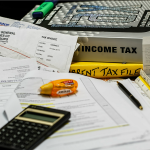 Reducing your tax payment
Reducing your tax payment
Once you have included all your income on your tax return you can turn to the payments that you have made that can be deducted against tax.
Pension payments
Payments made by you personally to your pension plan is deductible against tax. The contributions are made net of basic rate tax but you still get higher rate tax relief on all the payments made in the tax year.
If you are a contractor and a director, the company should have made the pension payment on your behalf. If this is the case do NOT include these payments on your self assessment return.
TIP: any contractor with their own company should arrange for the company to pay pension contributions, this will save you national insurance.
Gift Aid payments
Payments to charity are made after deduction of basic rate tax (and the charity can reclaim this money) but you will receive tax relief at the higher rate of tax.
Subscriptions to charities such as the National Trust are made as gift aid payments and some day trip entrance fees will also be paid under gift aid, for example, a visit to the Historic Dockyards at Portsmouth.
Deduction of tax at source
Income such as interest income and dividends will have tax deducted by the payor, that is, tax is deducted at source. This can be used as a part payment of your tax bill.
PAYE
If you receive a salary income tax will be deducted by your employer under the PAYE scheme; the amount deducted each month will depend on your tax rate and your notice of coding. The tax deducted under PAYE is a prepayment of your final tax bill. The information for these payments should be included on your end of year P60 and should be added to the employment pages of the tax return.
Mileage
If your employer reimburses you for mileage at 45 pence per mile up to 10,000 miles and 25 pence thereafter you will not be taxed on the receipt. If your employer reimburses you at less than the 45p or 25p you can claim a deduction on your tax return for the difference between the rate your employer reimbursed you at and the HMRC rate.
Payments on account
If this is not your first year as self-employed then HMRC will have asked you to make a payment of tax on account of your final liability based on the last return you submitted. Two payments on account are made on 31 January in the tax year (31 January 2012) and 31 July following the tax year (31 July 2012) with a final payment due on 31 January following the tax year (31 January 2013).
Once you have collected all this information together you are ready for step three, completing and submitting your return online.
Do you need help?
Clearways Accountants prepare and submit many self assessment tax returns each year so we can help you meet your filing deadline with minimum stress. If you would like help with your self assessment tax return, contact us or give us a call on 01737 244298.
Links to the other posts in the series:
Step 1: Getting registered
Step 2: Income
Step 4: Completing your return
